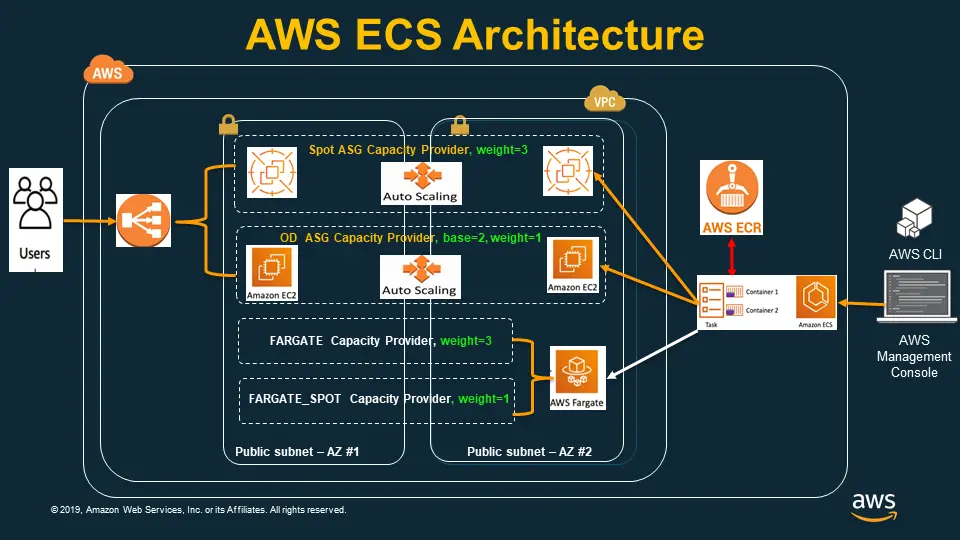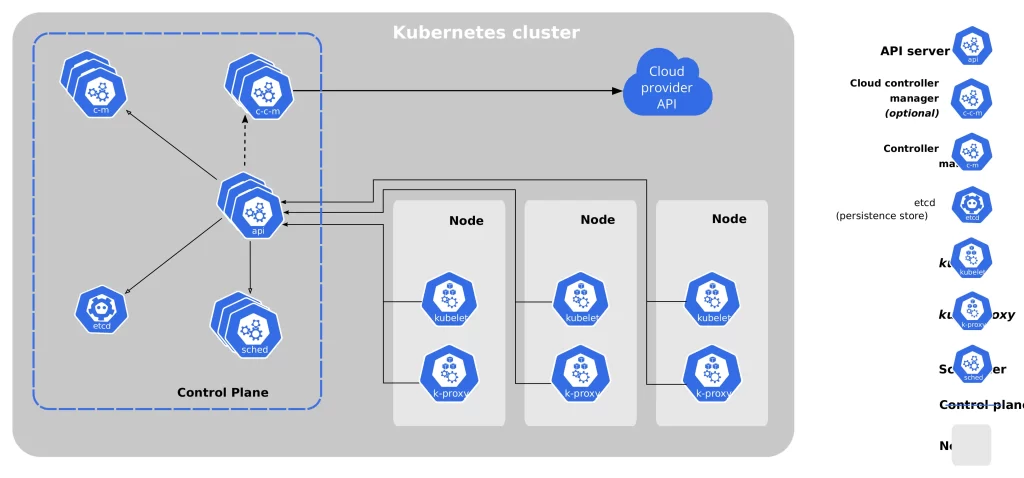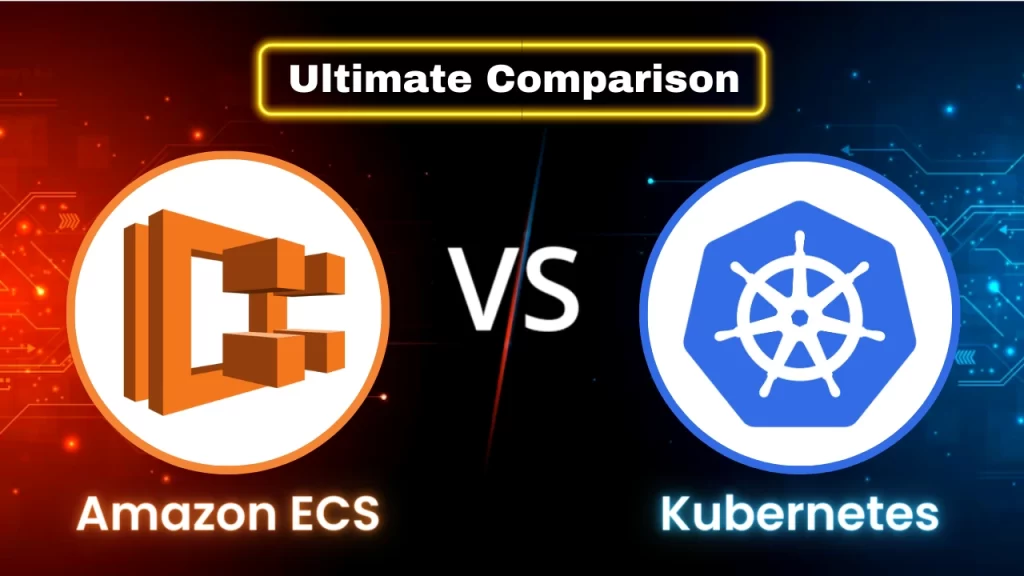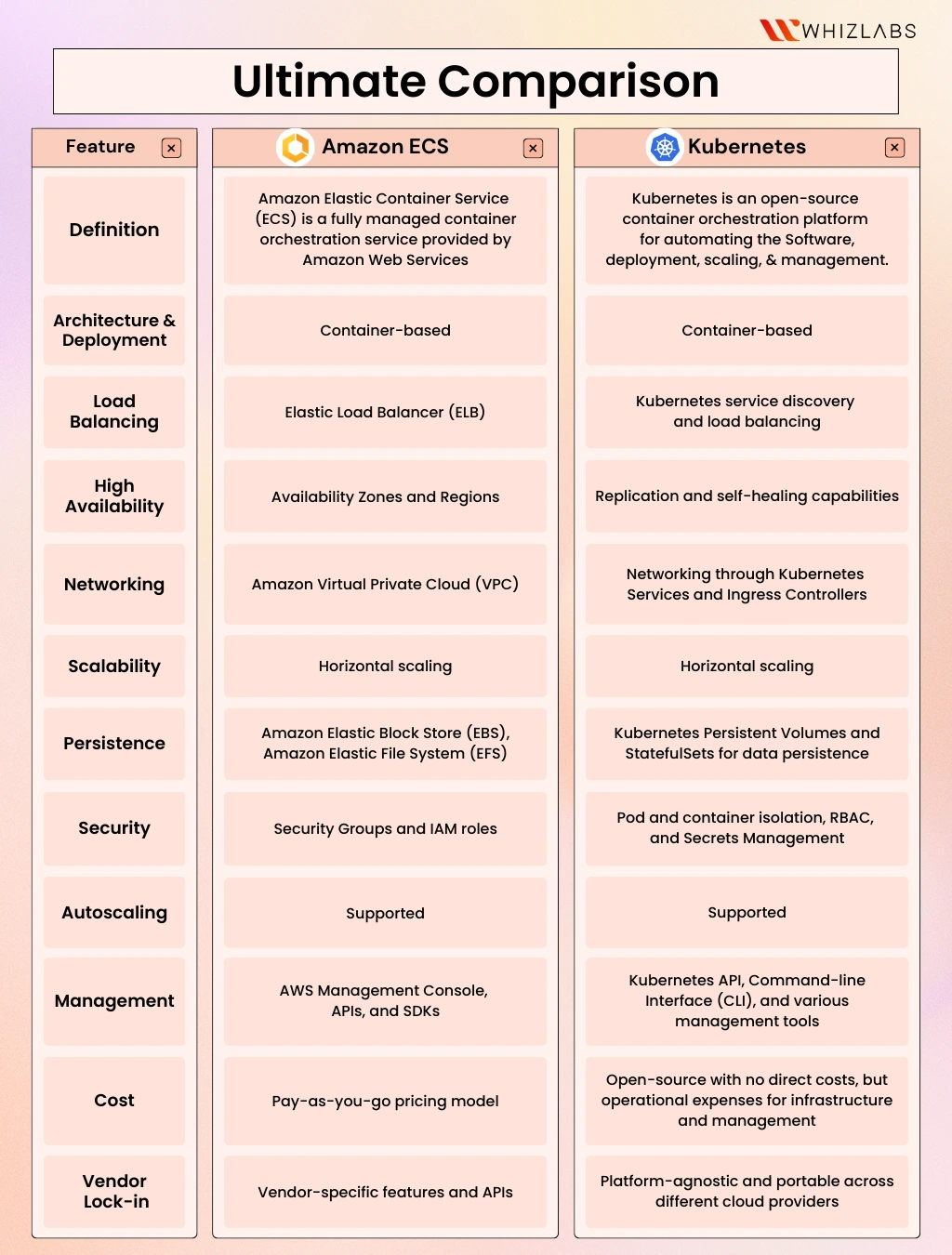When it comes to container orchestration tools for managing and scaling microservices, two of the biggest tools in the market are Kubernetes and Amazon Elastic Container Service (ECS). Choosing the right tool can have a significant impact on your application’s scalability, management, and overall operational efficiency.
In this blog post, we will thoroughly review each tool individually, discussing its advantages and disadvantages.
By the end of the comparison, you will have a clear understanding of which container orchestration tool, Kubernetes or Amazon ECS, is the most suitable choice for your web application based on your company’s specific needs.
So, let’s dive into the details and evaluate these two popular options.
Amazon ECS vs. Kubernetes: Ultimate Comparison
In the world of container orchestration, Kubernetes and Amazon Elastic Container Service (ECS) are two prominent tools. Kubernetes, developed by Google and hosted in the cloud, is a widely adopted container orchestration service that leverages Docker. It boasts a robust community and ecosystem.
On the other hand, Amazon ECS is a container orchestration tool that excels in scalability. It dynamically creates additional containers to meet application demand. Both tools have their own set of strengths and weaknesses, making it crucial to thoroughly review them in order to make an informed decision that aligns with your business requirements.
Amazon Elastic Container Service (ECS) and Kubernetes are two prominent container orchestration platforms that offer powerful capabilities for managing containerized applications.
While both solutions serve the purpose of container orchestration, they have distinct differences in terms of architecture, management philosophy, scalability, and ecosystem integration. In this comprehensive comparison, we will delve into the key aspects of Amazon ECS and Kubernetes to help you make an informed decision about which platform is better suited for your specific needs.
Architecture
ECS follows a simpler architecture, with a control plane managed by AWS. It uses a task definition to define the containerized application’s specifications and runs tasks on EC2 instances or AWS Fargate, a serverless computing engine.

Kubernetes employs a more complex architecture with a master control plane and worker nodes. It uses various components like the API server, scheduler, and controller to manage containers, services, and resources across a cluster of nodes.

Management Experience
Amazon ECS provides a fully managed experience, where AWS handles the underlying infrastructure and manages the control plane. This simplifies the setup and management process, making it easier for users to focus on deploying and scaling applications.
Kubernetes offers a flexible and customizable experience but requires more configuration and management effort. Users have more control over the environment but need to handle tasks like cluster setup, scaling, and upgrades themselves.
Scalability and Flexibility
The scalability of container orchestration platforms is a critical factor to consider when choosing the right tool for your needs. Both Kubernetes and Amazon ECS have made significant strides in scaling their deployments to accommodate larger clusters.
With the release of Kubernetes version 1.6, the platform introduced the ability to scale up to 5,000 node clusters. This means that Kubernetes can effectively handle the management and orchestration of a vast number of nodes within a single cluster. Additionally, if the need arises to scale beyond this limit, Kubernetes supports the use of multiple clusters, allowing for further scalability.
Similarly, Amazon ECS has demonstrated its scalability by successfully scaling up to over a thousand container nodes without noticeable performance degradation. This showcases its ability to handle large-scale deployments and accommodate the growth of containerized applications.
ECS provides robust scaling capabilities, allowing users to scale their tasks or services automatically based on predefined rules or application demand. It integrates seamlessly with other AWS services, such as Auto Scaling, ELB, and CloudWatch, to achieve dynamic scaling.
Meanwhile, Kubernetes offers extensive scaling features, including horizontal pod autoscaling and cluster autoscaling. It allows users to define custom scaling rules and can scale workloads across multiple clusters or even cloud providers.
Ecosystem and Community
Amazon ECS benefits from the extensive AWS ecosystem, including various complementary services like AWS Fargate, Amazon ECR for container registry, and integration with AWS IAM, CloudWatch, and CloudFormation. However, the ECS community is relatively smaller compared to Kubernetes.
On the other hand, Kubernetes has a vast and thriving community, with a rich ecosystem of third-party tools, plugins, and integrations. It supports multiple container runtimes, cloud providers, and operating systems, providing more flexibility and choice.
Learning Curve and Adoption
The Amazon ECS offers a simpler learning curve, making it easier for users to get started quickly, especially if they are already familiar with AWS services. It is well-suited for organizations heavily invested in the AWS ecosystem.
Kubernetes has a steeper learning curve, requiring users to understand its concepts, APIs, and YAML-based configurations. However, Kubernetes has gained widespread adoption and is considered a de facto standard for container orchestration, making it a valuable skill in the industry.
Advantages of Kubernetes over Amazon ECS
Here are some pros and cons of Kubernetes over Amazon ECS have been listed below:
- Deployment Flexibility: Kubernetes can be deployed on-premises, in private clouds, and public clouds, providing greater flexibility and avoiding vendor lock-in. It can run on any x86 server or even on laptops, enabling organizations to choose the deployment environment that best suits their needs. In contrast, Amazon ECS is limited to running containers on the Amazon platform.
- Wide Variety of Storage Options: Kubernetes supports a wide range of storage options, including on-premises SANs and public cloud storage services. This flexibility allows organizations to utilize their existing storage infrastructure or leverage storage solutions from different providers.
In contrast, Amazon ECS primarily relies on Amazon’s storage solutions, such as Amazon EBS, limiting the options for external storage.
- Extensive Experience from Google: Kubernetes is built on Google’s extensive experience in running Linux containers at scale. The platform inherits valuable insights and best practices from Google’s internal container management systems. This experience contributes to the robustness and reliability of Kubernetes, making it a trusted choice for organizations.
- Enterprise Offerings and Support: Kubernetes is backed by enterprise offerings from both Google (Google Kubernetes Engine – GKE) and RedHat (OpenShift). These offerings provide additional features, support, and services tailored for enterprise environments. They ensure that organizations have access to professional support and enterprise-grade capabilities when using Kubernetes.
In comparison, Amazon ECS is validated and supported within the Amazon ecosystem and does not have as many options for enterprise-grade support outside of Amazon.
- Largest Community and Open Source: Kubernetes boasts the largest community among container orchestration tools, with over 50,000 commits and 1200 contributors. This vibrant community ensures a wealth of resources, including extensive documentation, tutorials, plugins, and third-party integrations.
It also promotes rapid development and innovation within the platform. In contrast, while Amazon ECS has open-source components like Blox, the overall community and code contributions are smaller.
Considering these advantages, Kubernetes offers greater deployment flexibility, a wider range of storage options, industry expertise from Google, extensive community support, and enterprise-grade offerings from multiple vendors. These factors make Kubernetes an attractive choice for organizations looking for a highly flexible and widely adopted container orchestration solution.
Common features between ECS and Kubernetes
The common features that exist between Amazon ECS and Kubernetes were listed below:
Networking
Both Kubernetes and Amazon ECS provide networking features such as load balancing and DNS. They enable applications to be accessed from the internet and distribute traffic among containers or instances.
Overall, Kubernetes offers flexibility, multi-cloud support, a rich ecosystem, advanced scaling capabilities, and industry adoption, making it a powerful choice for container orchestration. Its ability to avoid vendor lock-in and provide granular control over workload scaling sets it apart from ECS and other container services, allowing organizations to leverage the most suitable platform for their evolving needs.
Logging and Monitoring
For Kubernetes, there are various external tools available for logging and monitoring, including Elasticsearch/Kibana (ELK), Heapster/Grafana/InfluxDB. These tools offer capabilities for collecting logs, analyzing performance metrics, and visualizing data.
In the case of Amazon ECS, the partner ecosystem includes external tools such as Datadog and Sysdig Cloud, in addition to the built-in logging and monitoring services provided by AWS CloudWatch and CloudTrail. These tools offer similar functionalities for logging, monitoring, and analyzing containerized applications in the ECS environment.
Autoscaling
Both Kubernetes and Amazon ECS support native autoscaling. This means that the container orchestration platforms can automatically scale the number of running instances or containers based on predefined metrics or rules. Autoscaling helps maintain application performance and efficiently utilize resources by adjusting the container or instance count as demand fluctuates.
Management Tools
Kubernetes management actions can be performed using the kubectl command-line interface (CLI) and the Kubernetes Dashboard, a web-based user interface. These tools allow users to manage and control various aspects of their Kubernetes clusters and applications.
In the case of Amazon ECS, management can be done through the AWS Management Console, which provides a graphical user interface (GUI) for managing ECS resources, configuring services, and monitoring containers.
Additionally, the AWS Command Line Interface (CLI) offers a command-line tool for interacting with ECS and performing management tasks.
Both Kubernetes and Amazon ECS offer networking capabilities, logging, and monitoring options, support for autoscaling, and management tools.
However, the specific tools and services may differ, and users can choose based on their preferences and requirements.
FAQs
Why is Kubernetes superior to ECS?
If you have complete and detailed control over whether your workload can scale using Kubernetes. When you need to transition to a more powerful platform, you may prevent vendor lock-in with ECS or any of the other container services by doing this.
Is Kubernetes similar to Amazon ECS?
Amazon ECS is comparable to EKS, except instead of using Kubernetes, it uses a proprietary control plane. The hosting infrastructure must be provisioned by the user, but ECS manages container orchestration.
What distinguishes ECS and EKS most significantly?
Elastic Kubernetes Service (AWS EKS) is a completely managed Kubernetes service, whereas Elastic Container Service (AWS ECS) is a fully managed container orchestration service. This is the main distinction between AWS EKS and AWS ECS.
Whether Amazon ECS is scalable?
AWS’s ECS is a fully-managed, highly scalable container orchestration solution. It makes running, stopping, and managing Docker containers on a cluster simple. For individuals who already use AWS and are looking for an easy way to run and grow containerized apps, the service is a popular option.
Amazon Elastic Container Service is primarily used for?
Amazon Elastic Container Service (ECS) is primarily used for container orchestration and management. It allows you to run and manage Docker containers in a highly scalable and reliable manner.
Conclusion
After closely examining the features and characteristics of Kubernetes and Amazon ECS, it is time to determine which container orchestration tool is the best fit for your needs.
If you require multi-cloud capabilities and want the flexibility to deploy your applications across various cloud providers, Kubernetes emerges as the clear choice. Its extensive community support, rich ecosystem, and ability to work with multiple container runtimes make it an ideal option for organizations seeking a multi-cloud strategy.
On the other hand, if your primary focus is on reducing IT labor, hosting costs, and management complexity, Amazon ECS is the recommended choice. Its fully managed nature and seamless integration with other AWS services simplify the deployment and scaling processes, allowing you to focus more on your applications rather than infrastructure management.
Ultimately, the decision between Kubernetes and Amazon ECS depends on your specific requirements and priorities. To learn more about Amazon ECS and Kubernetes, try our hands-on labs and sandboxes.
If you have any questions about this blog post, please feel free to comment us!
- 7 Pro Tips for Managing and Reducing Datadog Costs - June 24, 2024
- Become an NVIDIA Certified Associate in Generative AI and LLMs - June 12, 2024
- What is Azure Data Factory? - June 5, 2024
- An Introduction to Databricks Apache Spark - May 24, 2024
- What is Microsoft Fabric? - May 16, 2024
- Which Kubernetes Certification is Right for You? - April 10, 2024
- Top 5 Topics to Prepare for the CKA Certification Exam - April 8, 2024
- 7 Databricks Certifications: Which One Should I Choose? - April 8, 2024


